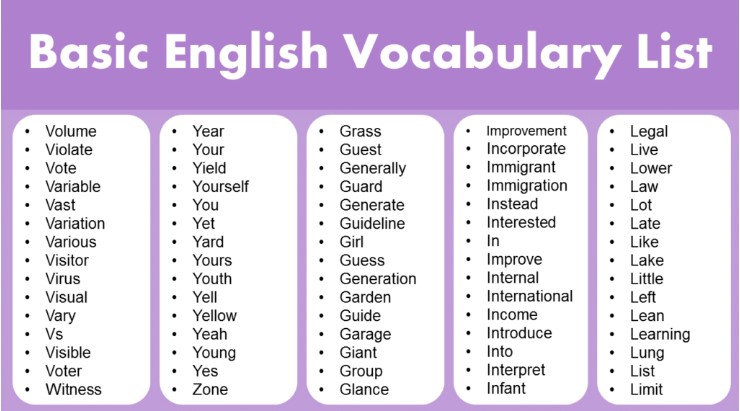Warning: Object of class WP_Post could not be converted to int in /home/boztmxfb/glamoursinsider.com/wp-content/plugins/poststreamline/poststreamline.php on line 558
English Vocabulary Words are the building blocks of effective communication. A rich vocabulary allows writers to convey ideas more precisely, express emotions clearly, and make a lasting impact on readers. Whether you are crafting essays, professional emails, or creative stories, incorporating the right English vocabulary words elevates your writing from ordinary to compelling.
Consider the difference between saying “He was very happy” versus “He was elated.” The second expression communicates emotion more vividly and engages the reader instantly. This is the power of a strong vocabulary.
Why Expanding Your Vocabulary Matters
A robust vocabulary does more than just make your writing sound polished. It enhances comprehension, sharpens thinking, and enables you to articulate thoughts with nuance. Using varied English vocabulary words prevents repetition and monotony, making your writing more captivating and professional.
For example, instead of repeatedly using “good,” writers can use “excellent,” “remarkable,” or “outstanding,” depending on the context. These small adjustments dramatically improve tone and clarity.
Common Categories of English Vocabulary Words
To boost writing skills, it’s helpful to categorize vocabulary into practical groups. Below are some essential categories with examples.
Descriptive Words
Descriptive words allow you to paint vivid pictures and convey sensory experiences.
-
Happy → Joyful, Ecstatic, Elated
-
Sad → Melancholy, Gloomy, Heartbroken
-
Big → Enormous, Massive, Immense
Using precise English vocabulary words in descriptions helps readers feel emotions and visualize scenes clearly.
Action Words
Action words, or verbs, make sentences dynamic and engaging.
-
Walk → Stroll, Saunter, March
-
Speak → Utter, Articulate, Declare
-
Run → Sprint, Dash, Race
Choosing the right verb changes the rhythm and intensity of your writing, making it more lively and compelling.
Transition Words
Transition words improve flow and coherence in writing.
-
But → However, Nevertheless, On the other hand
-
And → Moreover, Additionally, Furthermore
-
Because → Since, As, Due to
Well-placed transition English vocabulary words ensure smooth connections between sentences and ideas, improving readability.
Persuasive and Academic Words
Persuasive and academic words strengthen arguments and convey authority.
-
Important → Crucial, Vital, Paramount
-
Prove → Demonstrate, Establish, Substantiate
-
Show → Illustrate, Highlight, Depict
In essays, reports, and professional writing, these vocabulary words create a confident and authoritative tone.
Real-Life Example: Vocabulary Transformation
Consider a simple sentence: “The project was good and the team worked hard.”
By incorporating richer English vocabulary words, it becomes: “The project was remarkable, and the team collaborated diligently.”
The revised sentence conveys more emotion, professionalism, and clarity, leaving a stronger impression on the reader.
Storytelling with English Vocabulary Words
Storytelling is one of the best ways to internalize new vocabulary. Imagine narrating a scene:
-
Basic: “She was scared and ran fast.”
-
Enhanced: “She was petrified and sprinted swiftly through the dim corridor.”
The enhanced version uses precise English vocabulary words like “petrified” and “sprinted” to heighten tension and engage the reader.
Tips to Expand Your English Vocabulary Words
Improving vocabulary is a continuous process. Here are strategies to integrate new words naturally:
-
Read extensively: Books, articles, and essays expose you to diverse vocabulary.
-
Keep a vocabulary journal: Note down new words with meanings and examples.
-
Practice writing daily: Incorporate at least 5 new words in writing exercises.
-
Use context: Don’t just memorize words; understand how they fit naturally in sentences.
-
Review and revise: Regularly revisit new vocabulary to reinforce retention.
Consistency and application are key to making English vocabulary words a permanent part of your writing toolkit.
Advanced Vocabulary for Professional Writing
For professional and academic writing, consider using these advanced vocabulary words:
-
Analyze → Examine, Scrutinize, Evaluate
-
Improve → Enhance, Refine, Optimize
-
Problem → Challenge, Obstacle, Issue
-
Solution → Resolution, Remedy, Strategy
Replacing simple words with these precise alternatives demonstrates sophistication and clarity, crucial for essays, reports, and presentations.
Fun Ways to Learn Vocabulary
Learning doesn’t have to be boring. Here are creative ways to expand your English vocabulary words:
-
Word games: Crossword puzzles, word searches, and apps like Scrabble.
-
Flashcards: Visual aids help memory retention.
-
Synonym challenges: Pick a common word and find 10 alternatives.
-
Writing prompts: Try writing a paragraph using only new vocabulary words.
Interactive learning makes vocabulary acquisition enjoyable and practical.
Integrating Vocabulary into Everyday Writing
To ensure new words stick, integrate them into daily writing tasks:
-
Emails: Use synonyms for common expressions.
-
Journals: Reflect on your day with varied descriptive words.
-
Social media: Craft posts with precise and creative language.
-
Academic tasks: Replace repetitive words with richer alternatives.
Frequent application ensures that your English vocabulary words become second nature.
Story Example: From Casual to Professional
Priya, a content writer, realized her articles often sounded repetitive and flat. She began actively learning and using English vocabulary words. Instead of writing “very good content,” she wrote “exceptional content” or “insightful analysis.” Her articles gained praise from editors and readers, showing how vocabulary choices elevate writing quality.
Continuous Improvement with English Vocabulary Words
Improving vocabulary is a lifelong journey. Keep exploring, practicing, and revising. Maintain a habit of:
-
Reading diverse genres
-
Noting down unfamiliar words
-
Applying words in writing and conversation
-
Reviewing regularly
Over time, your writing will naturally reflect a richer, more precise, and professional vocabulary, making communication clearer and more persuasive.
Read also:
pluviophile
lumon definition
enmeshment meaning
skedaddle meaning
show synonym
